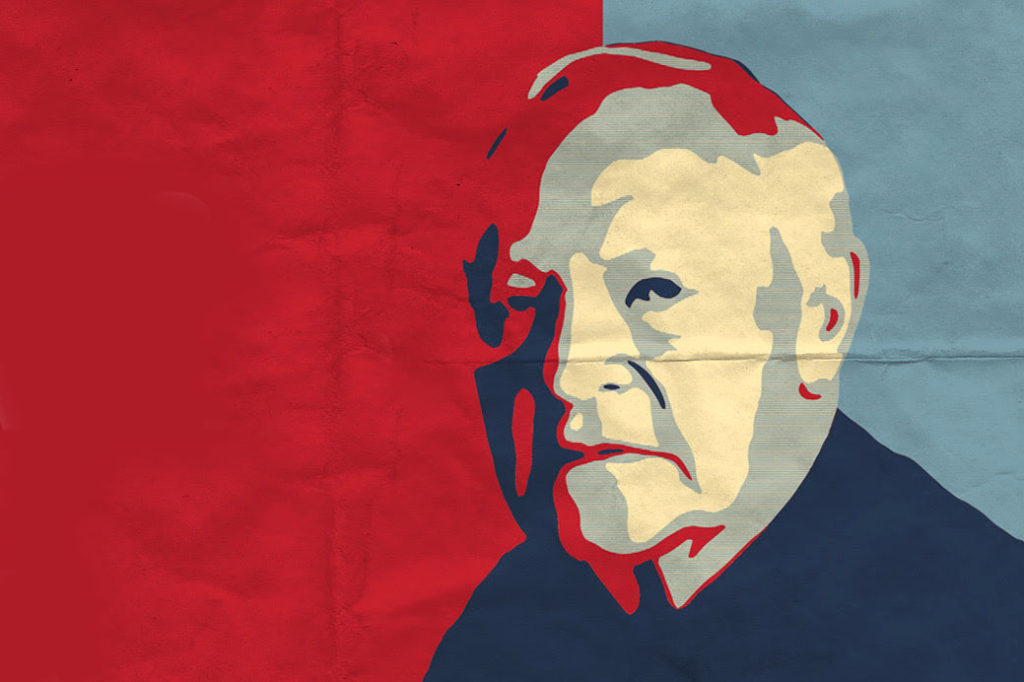
The fatal hubris of an over-confident leader, the common people rejecting rational argument in favour of an appeal to their emotions, a spectre from the past returning to haunt a would-be successor, and the struggle between the imperatives of morality and power… It’s not difficult to find contemporary relevance in this timeless and timely drama. Overt up-dating is unnecessary and unwise – one recent production in Manhattan lost sponsorship because it had a Trump look-alike stabbed to death on stage.
This Bristol Old Vic and Bristol Old Vic Theatre School joint production avoids such clumsiness. Nevertheless, by having Caesar played by a veteran actor (Julian Glover) and all his assassins played by BOVTS trainees, it brings to the fore the current issue of a young generation eager for change. This production does not start in the usual way with Roman citizens aimlessly wandering the streets looking for Caesar’s victory parade. Here the action begins far more violently; a crowd of banner-wielding youths charge noisily through the theatre, chanting pro-Caesar slogans. Their excitement is not easily quelled; there is a sense that mob rule could break out soon. They are full of wild spontaneity; they have, shall we say, momentum. But when Caesar appears he is calm, confident and self-assured. He scornfully dismisses the dire warnings of the soothsayer (John Hartoch). His apparent security is echoed in Sarah Mercadé’s set design of huge, imposing monolithic blocks that speak of absolute power. But this Caesar is old, rumpled and complacent. He’s a sucker for flattery, too. Initially persuaded by the fearful, superstitious Calpurnia (Lynn Farleigh) that he should not go to the senate, he quickly changes his mind when he hears that he is to be crowned there. In stark contrast, the lean and hungry Cassius (Edward Stone) is sharp-suited, quick-talking, and full of energy. His urgent interchange with Brutus (Freddie Bowerman) is very effectively played. Brutus is cautious and diffident, while Cassius is impatient, manipulative and very persuasive in his argument that Caesar has become too much of a threat to democracy to be allowed to live. Similar conversations have surely been played out many times by men in suits in the lobby of the House of Commons, though presumably with less murderous conclusions.
The build-up to the assassination is well-choreographed and beautifully paced. The tension winds up to snapping point; Caesar falls, and mayhem follows. With its large, youthful cast this production does mayhem well, though there were times when I found all the rampaging and shouting a tad wearisome. Brutus’s speech over the body of Caesar is delivered well by Bowerman, conveying clearly the idea that this essentially moral politician has reluctantly concluded that Caesar’s death was a cruel necessity. Loyalty to the state has outweighed loyalty to an old friend. Naively, he leaves the stage to Ross O’Donnellan’s rambunctious Mark Antony. Loud and earthy, this is a politician who has an instinctive understanding of the mob; he is of the people. In comparison with Brutus’s reasoned but somewhat coldly academic address, his speech is a craftily constructed, highly emotive exercise in rabble-rousing. I enjoyed the sheer physicality of O’Donnellan’s performance, though some words were lost in the noise. A touch less frenetic energy would allow for a more nuanced delivery of this great piece of rhetoric.
Antony, of course, wins the day, and the final scenes depicting the battle that brings about Brutus’s defeat are very effectively staged. Jessica Edkins’s sound design creates the noise of modern warfare most convincingly; we hear helicopters fly overhead while shadowy figures run back and forth through clouds of smoke, the laser beams on their weapons barely penetrating the fog of war.
Initially it may be a surprise to discover that some roles have undergone a change of gender; Decius has become Decia, Octavius is now Octavia, and Casca, too, is female. This works very well indeed. I particularly liked Eleanor House’s infinitely cynical Casca, an outsider with a sneering contempt for Caesar’s pretended rejection of the crown. Rosy McEwen is an impressive Octavia, leaving us in no doubt in the concluding scene that her no-nonsense, clear-eyed grip on power spells future triumvirate troubles for Mark Antony. When she orders that Brutus’s body be laid in her tent overnight, not his, she is making it all too clear she is taking possession of their victory.
This collaboration between the Bristol Old Vic and the BOVTS is a great success. Director Simon Dormandy has given us a pacey, energised Julius Caesar that takes full advantage of the youthfulness of its talented cast and production crew. There is no doubt that they would have gained much during rehearsal from their senior colleagues, Julian Glover, Lynn Farleigh and John Hartoch. This is a dynamic, exciting production that never flags. There are times when a little more considered attention could be given to the words, but generally this wonderful, and wonderfully pertinent play is delivered with admirable clarity. Bravo! ★★★★★ Mike Whitton 15th June 2017


